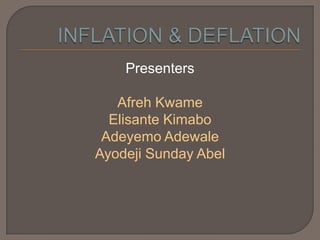
Inflation _deflation
- 1. Presenters Afreh Kwame Elisante Kimabo Adeyemo Adewale Ayodeji Sunday Abel
- 2. Definition of Inflation Types of Inflation Causes of Inflation Cost of Inflation Inflation in a country like Zimbabwe Inflation expectation in Europe Definition Deflation Causes of Delation Deflation Japan and Finland Conclusion
- 3. Persistent Appreciable increase General price level Goods and services Factors of production OR Too much money chasing few goods Inflation is an essentially monetary phenomenon.
- 4. Suppressed Inflation Creeping Inflation Strato-Inflation Hyper-Inflation/Galloping Inflation Staflation Bottleneck Inflation
- 5. When the inflation rate accelerate to several hundreds to many thousands per cent per day, then we have hyper-inflation. Hyperinflation usually occur in a political crisis when a weak government loses control of the economy and turns to printing or borrowing money to pay its debts. Examples of countries with this type of inflation are; Germany in 1923 when the rate of inflation hit 3.25 × 106 percent per month (prices double every 49 hours) Greece during its occupation by German troops (1941-1944) with 8.55 × 109 percent per month (prices double every 28 hours).
- 6. The most severe known incident of inflation was in Hungary after the end of World War II at 4.19 × 1016 percent per month (prices double every 15 hours). More recently, Yugoslavia suffered 5 × 1015 percent inflation per month (prices double every 16 hours) between October 1, 1993 And January 24, 1994. Zimbabwe
- 7. Country Month with Highest monthly Equival Time highest inflation rate ent required inflation rate daily for prices inflation to double rate Hungary July 1946 1.30 x 1016% 195% 15.6 hours Mid-November Zimbabwe 2008 (latest 79,600,000,000,000 % 24.7 hours 98.0% measurable) 1.4 days Yugoslavia January 1994 313,000,000% 64.6% Germany October 1923 29,500% 20.9% 3.7 days Greece November 1944 11,300% 17.1% 4.5 days China May 1949 4,210% 13.4% 5.6 days
- 8. Demand-Pull Inflation: As a results of an increase in aggregate demand. Supply or Cost-Pull Inflation: Resulting from a reduction or a decrease in aggregate supply.
- 9. Distributional effects e.g weaker social groups in society such as pensioners on fixed income lose and also between borrowers and lenders Breakdown in the functions of money. ”Shoe leather” and ”menu cost” Foreign trade It is difficult to renegotiate some prices, and particularly wages.
- 10. ZIMBABWE’S chart topping inflation reportedly at 24,000 % qualifies the nation as experiencing hyper inflation. Zimbabwe’s hyper-Inflation is a result of the monetary authority irresponsibly borrowing money to pay all its expenses and funding quasi-fiscal activities. ZIMBABWE is so short on consumer goods, the government can't even calculate inflation, the chief statistician said on Tuesday(12.11.09)
- 11. Zimbabwe's inflation -- already the highest in the world -- hit 7,634.8 percent. The Zimbabwe dollar has strengthened against the U.S. dollar on the black market, rising to Z$1.5 million per dollar on Tuesday from a low of ZW$2.4 million. Scenario: "I came here at five (0300 GMT) and just got ZW$5 million. What can I do with that money," an angry mother of two who identified herself only as Auxilia said as she left a bank where a long queue stretched for a couple of blocks. The amount is equivalent to three days of bus fare
- 13. Zimbabwean Central Bank to introduced new currency Salaries are falling to keep pace with galloping inflation. Government introduced price controls Devaluation of the Zimbabwe dollar A reduction of lending rates Incentives for the manufacturing Mining sectors to stimulate exports.
- 14. Persistent tendency General price level Goods and services Factors of production Fall
- 15. A decrease in money supply Increase in the supply of goods Fall in the demand for goods
- 16. Deepening deflation will prompt the Bank of Japan to keep interest rates near zero. Japan is suffering severe deflation, primarily because of the yen’s sharp rise and the downturn in world trade. Joblessness is rising at a record rate Analysts expect deflation to accelerate to a record rate in coming months as the worst global recession in 60 years forces companies to cut prices, on top of sharp falls in commodity prices.
- 17. Companies will have difficulty increasing profits companies effective burden from borrowing money will increase With job conditions worsening, consumption will remain weak
- 18. In 2008, CPI rose by 3.5% and on average by 4.1% from the previous year. Prices of goods and services are still being depressed by lowered interest rates as well as house and fuel prices. Prices of items like foodstuffs, rented housing and restaurant and cafe’ products are expected to rise more sharply than others. The CPI annual average will rise by no more than o.1% and in december 2009 prices may actually be lower than one year earlier. Just last Friday, Finnish consumer prices shrank by 1.5 per cent in October, compared with September's deflation rate of one per cent.
- 19. Inflationrate can be controlled by the following policies Monetary policy open market operation Increase in reserve requirement Special deposit Increase bank rate demonetisation Fiscal policy High income tax/increase direct tax
- 20. http://www.newzimbabwe.com/pages/inflati on180.17386.html Article by Prof. Steve H. Hanke, February 5, 2009. http://www.cato.org/zimbabwe Finnish economic outlook for 2009 A handout on macroeconomics by Prof. Lawrence Adu Kofi(University of Cape Coast, Ghana )
